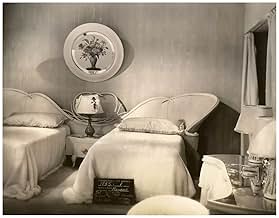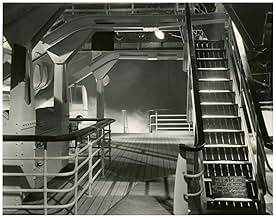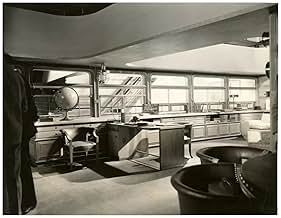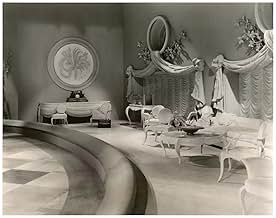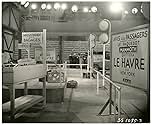IMDb RATING
6.7/10
1.4K
YOUR RATING
A woman pretends to be royalty in order to get aboard a cruise ship.A woman pretends to be royalty in order to get aboard a cruise ship.A woman pretends to be royalty in order to get aboard a cruise ship.
Monya Andre
- Undetermined Role
- (uncredited)
Benny Bartlett
- Ship's Bellhop
- (uncredited)
Virginia Cabell
- Undetermined Role
- (uncredited)
George Chandler
- Film Man
- (uncredited)
David Clyde
- Assistant Purser
- (uncredited)
Keith Daniels
- Reporter
- (uncredited)
6.71.3K
1
2
3
4
5
6
7
8
9
10
Featured reviews
A case of life imitating art--and most enjoyable.
The plot of this movie seems rather crazy. After all, Carole Lombard plays an American who can't get a job in Hollywood, so she pretends to be a Swedish princess (sort of like a royal version of Garbo) and is adored--and offered a film contract. Now you'd think this is a totally ridiculous idea, but in real life just a year later, Samuel Goldwyn introduced a Norwegian sensation--Sigrid Gurie. Unfortunately, when it was found out that Gurie was born in Brooklyn (exactly like Lombard's character), it didn't exactly help her film career! Now you'd think that having Lombard playing a rather broad Garbo impersonation would be silly, but because she was such a likable actress and it's such a cute film, they manage to carry it off well.
The film begins with Lombard coming aboard an ocean liner with a lot of hubbub from the press--after all, they think a princess is on her way to America. Once aboard, band leader Fred MacMurray falls for her and pursues her. However, unexpectedly, the comedy becomes a murder mystery--and both MacMurray and Lombard are suspects. However, MacMurray also knows that she was the victim of a blackmailer who was just murdered--and he knows she has something to hide. There's much more to the film than this, but you can just see it yourself--it's worth it.
Overall, the film works well because the writing is very good and the actors have nice supporting character actors on hand--such as William Frawley, Douglas Dumbrille and Sig Ruman. Plus, the ever slimy Porter Hall made for a great blackmailer. Clever and most enjoyable from start to finish.
Oh, and I must point out that this film allows the viewer to hear MacMurray Crooning! His voice, though a tad weak, was actually far better than I expected and was rather reminiscent of the singing of Dick Powell.
The film begins with Lombard coming aboard an ocean liner with a lot of hubbub from the press--after all, they think a princess is on her way to America. Once aboard, band leader Fred MacMurray falls for her and pursues her. However, unexpectedly, the comedy becomes a murder mystery--and both MacMurray and Lombard are suspects. However, MacMurray also knows that she was the victim of a blackmailer who was just murdered--and he knows she has something to hide. There's much more to the film than this, but you can just see it yourself--it's worth it.
Overall, the film works well because the writing is very good and the actors have nice supporting character actors on hand--such as William Frawley, Douglas Dumbrille and Sig Ruman. Plus, the ever slimy Porter Hall made for a great blackmailer. Clever and most enjoyable from start to finish.
Oh, and I must point out that this film allows the viewer to hear MacMurray Crooning! His voice, though a tad weak, was actually far better than I expected and was rather reminiscent of the singing of Dick Powell.
Russians, and Germans, and the Japanese! Oh my!...
... very shortly before all three of these nations would become troublesome for the US and the rest of the world for that matter.
It's a combination comedy/romance/drama/mystery/musical film set aboard a ship that is headed from Europe to America that could have easily been too busy and thus incoherent, and yet it works.
Carole Lombard is the Swedish Princess Olga and Allison Skipworth is her companion/lady-in-waiting as Olga travels to America for an acting career with Transatlantic Studios. Except she's not. She's a Brooklyn chorus girl who is pretending to be a princess, because the studio wasn't interested in her as just another American aspiring actress, but as a princess she got their attention and a contract. Lombard does a great Greta Garbo imitation throughout, and it's thus funny when she lapses into her Brooklyn accent when frustrated or she forgets herself. Fred McMurray plays King Mantell, a successful bandleader and concertina player who wants to romance the princess, but she is (initially) having none of it, because to let someone get too close might disclose her ruse. McMurray is paired with William Frawley as his manager, decades before they are teamed again on "My Three Sons".
A blackmailer (Porter Hall) tries to shake down both Mantell and the princess. At the same time the ship's captain (George Barbier) receives a cable announcing that there is an escaped French convict on board. Plain sailing this isn't. Luckily there is a group of detectives on board who are heading for a conference. They are Douglass Dumbrille representing France, Lumsden Hare representing the U. K., Sig Ruman representing Germany, Mischa Auer representing the Soviet Union and Tetsu Komai representing Japan. There are several jokes about crime and punishment in the Soviet Union surrounding the Russian detective, but nobody says anything about Germany or Japan because they are not seen as a threat yet. It is near the end of a rare period of peace in the world during the 20th century. The vacation of these gentlemen is interrupted when two murders are committed.
It is a wonderful contrivance in script-writing as to how all aspects of this multi-faceted film gel together relatively seamlessly. One moment William Frawley makes another one of his funny down to earth statements, then we go straight over to downright skullduggery and high drama. In the midst of it all Fred MacMurray, who was quite an accomplished musician, gives us a song in the middle of the picture.
I'd say that this busy and engaging film is definitely worth your time.
It's a combination comedy/romance/drama/mystery/musical film set aboard a ship that is headed from Europe to America that could have easily been too busy and thus incoherent, and yet it works.
Carole Lombard is the Swedish Princess Olga and Allison Skipworth is her companion/lady-in-waiting as Olga travels to America for an acting career with Transatlantic Studios. Except she's not. She's a Brooklyn chorus girl who is pretending to be a princess, because the studio wasn't interested in her as just another American aspiring actress, but as a princess she got their attention and a contract. Lombard does a great Greta Garbo imitation throughout, and it's thus funny when she lapses into her Brooklyn accent when frustrated or she forgets herself. Fred McMurray plays King Mantell, a successful bandleader and concertina player who wants to romance the princess, but she is (initially) having none of it, because to let someone get too close might disclose her ruse. McMurray is paired with William Frawley as his manager, decades before they are teamed again on "My Three Sons".
A blackmailer (Porter Hall) tries to shake down both Mantell and the princess. At the same time the ship's captain (George Barbier) receives a cable announcing that there is an escaped French convict on board. Plain sailing this isn't. Luckily there is a group of detectives on board who are heading for a conference. They are Douglass Dumbrille representing France, Lumsden Hare representing the U. K., Sig Ruman representing Germany, Mischa Auer representing the Soviet Union and Tetsu Komai representing Japan. There are several jokes about crime and punishment in the Soviet Union surrounding the Russian detective, but nobody says anything about Germany or Japan because they are not seen as a threat yet. It is near the end of a rare period of peace in the world during the 20th century. The vacation of these gentlemen is interrupted when two murders are committed.
It is a wonderful contrivance in script-writing as to how all aspects of this multi-faceted film gel together relatively seamlessly. One moment William Frawley makes another one of his funny down to earth statements, then we go straight over to downright skullduggery and high drama. In the midst of it all Fred MacMurray, who was quite an accomplished musician, gives us a song in the middle of the picture.
I'd say that this busy and engaging film is definitely worth your time.
Diverse elements don't quite jell
'The Princess Comes Across' was billed as 'a curious blend of comedy, murder-mystery, romance and music'; the 'curious' is certainly without question, but the degree to which the mix blends is, I feel, open to some doubt.
On the whole this is mainly satisfactory from the comedy angle. The sole musical element consists of casting our hero, played by Fred McMurray, as a concertina-player, a choice of instrument guaranteed to provide humour by its plebeian contrast to royalty. McMurray also sings a spoof ode to his concertina at the obligatory onboard musical evening that gathers all the murder suspects together -- save one! -- to stage the climax to the mystery plot. Unfortunately the solution to the latter turns out to be extremely lame, the plot line having been again almost totally subjugated to the need for laughs, and chiefly providing an excuse for the introduction of four stereotyped comedy detectives -- the dapper Frenchman, the pompous Prussian, the pipe-smoking Englishman and the devious Russian -- and an opportunity to implicate Carole Lombard's Swedish princess.
Lombard's haughty impression of the princess who just wants to be left alone is the main selling-point of the film, and the difficulties this role places in the way of romance with her cocky concertina artiste, 'King' Mantell, provide most of the rest of the comedy. Filmed through a gauzy lens, she has perhaps never been more beautiful, and the script handles her predicament with sympathy, but this one gimmick isn't quite enough in the end to carry off the rest of this mish-mash of a film.
Ultimately I felt that it strains at too many different goals and falls short of most of them: its worst actual defect is the hand-waving denouement to the detective plot, which is of a nature to embarrass Agatha Christie at her most contrived, but the climax to the romance also somehow struck me as arbitrary and unsatisfactory, given how hard her character has defended her increasingly impossible situation throughout the rest of the film. Again, I get the feeling that the plot demands of the comic and romantic set-up respectively are pulling in conflicting directions rather than forming a happy blend.
Not a long-lost classic, but a curiosity, perhaps; worth seeing for Lombard's title performance, but ultimately less than a harmonious whole.
On the whole this is mainly satisfactory from the comedy angle. The sole musical element consists of casting our hero, played by Fred McMurray, as a concertina-player, a choice of instrument guaranteed to provide humour by its plebeian contrast to royalty. McMurray also sings a spoof ode to his concertina at the obligatory onboard musical evening that gathers all the murder suspects together -- save one! -- to stage the climax to the mystery plot. Unfortunately the solution to the latter turns out to be extremely lame, the plot line having been again almost totally subjugated to the need for laughs, and chiefly providing an excuse for the introduction of four stereotyped comedy detectives -- the dapper Frenchman, the pompous Prussian, the pipe-smoking Englishman and the devious Russian -- and an opportunity to implicate Carole Lombard's Swedish princess.
Lombard's haughty impression of the princess who just wants to be left alone is the main selling-point of the film, and the difficulties this role places in the way of romance with her cocky concertina artiste, 'King' Mantell, provide most of the rest of the comedy. Filmed through a gauzy lens, she has perhaps never been more beautiful, and the script handles her predicament with sympathy, but this one gimmick isn't quite enough in the end to carry off the rest of this mish-mash of a film.
Ultimately I felt that it strains at too many different goals and falls short of most of them: its worst actual defect is the hand-waving denouement to the detective plot, which is of a nature to embarrass Agatha Christie at her most contrived, but the climax to the romance also somehow struck me as arbitrary and unsatisfactory, given how hard her character has defended her increasingly impossible situation throughout the rest of the film. Again, I get the feeling that the plot demands of the comic and romantic set-up respectively are pulling in conflicting directions rather than forming a happy blend.
Not a long-lost classic, but a curiosity, perhaps; worth seeing for Lombard's title performance, but ultimately less than a harmonious whole.
Routine Comedy/Mystery Made Watchable by an Excellent Cast
THE PRINCESS COMES ALONG is a comedy/mystery that unfortunately splits itself in the middle rather than being a mix of both genres throughout the film. It stars Carole Lombard as a girl from Brooklyn who while in England somehow manages to persuade film producers that she is a Princess Olga of Sweden, is signed to a contract and on her way to America to make movies. The movie opens with the excited passengers and press eager to see the Princess board the ship (just how this ruse is successfully pulled off strains credibility, Sweden, after all is a major nation, and surely any allegations that a Princess was going to enter pictures would have quickly been denied and disproved).
Fred MacMurray is a popular bandleader who is also on board and takes a shine to the Princess, attempting to romance her. She is indifferent but when a blackmailer is found dead in her room she becomes warmer to MacMurray's offer of friendship as he and buddy William Frawley remove the body. That still means a murder is loose on board and there's more mayhem in the works before the killer is revealed.
This movie starts out an engaging 1930's romantic comedy with Lombard deliciously parodying Garbo as the faux Royal Highness. Alas, the movie literally turns deadly after the murder and it's pretty much a straightforward murder mystery with a surprise that isn't much of a surprise if you've seen movies of this nature. Nevertheless, the cast does very well with the material, particularly the young Fred MacMurray, quite dashing in his late twenties, and the delicious character actress Alison Skipworth, here cast as the Princess' haughty traveling companion but in truth another unemployed actress and of course the always great Lombard. Months after their triumph in MY MAN GODFREY, Lombard is reunited with Mischa Auer with the latter in a small role as the Russian detective, one of several international detectives who just so happen to be all traveling on board. THE PRINCESS COMES ALONG is not one of the better Lombard films but it's a pleasant 90 minutes and worth at least one viewing.
Fred MacMurray is a popular bandleader who is also on board and takes a shine to the Princess, attempting to romance her. She is indifferent but when a blackmailer is found dead in her room she becomes warmer to MacMurray's offer of friendship as he and buddy William Frawley remove the body. That still means a murder is loose on board and there's more mayhem in the works before the killer is revealed.
This movie starts out an engaging 1930's romantic comedy with Lombard deliciously parodying Garbo as the faux Royal Highness. Alas, the movie literally turns deadly after the murder and it's pretty much a straightforward murder mystery with a surprise that isn't much of a surprise if you've seen movies of this nature. Nevertheless, the cast does very well with the material, particularly the young Fred MacMurray, quite dashing in his late twenties, and the delicious character actress Alison Skipworth, here cast as the Princess' haughty traveling companion but in truth another unemployed actress and of course the always great Lombard. Months after their triumph in MY MAN GODFREY, Lombard is reunited with Mischa Auer with the latter in a small role as the Russian detective, one of several international detectives who just so happen to be all traveling on board. THE PRINCESS COMES ALONG is not one of the better Lombard films but it's a pleasant 90 minutes and worth at least one viewing.
Comedy, con, romance, music and mystery on the high seas
This second pairing of Carole Lombard and Fred MacMurray packs a lot into 76 minutes. In this, they share time with a handful of famous detectives from around the world who are on board the same ship looking for an escaped killer. The mystery aspect fits in nicely with the otherwise romantic comedy of Lombard and MacMurray. And, other supporting players contribute as well - Alison Skipworth, Porter Hall and George Barbier.
"The Princess Comes Across" is a mixed genre of comedy, a con caper, murder mystery, and romance, with a good dose of music as well. It's almost too much to pack into 76 minutes and expect a film to be outstanding or exceptional, but this superb cast pulls it off nicely for a very good comedy.
Lombard assumes a Greta Garbo role with her Swedish-English accent, playing a fake Princess Olga. And, MacMurray, as King Mantell, uses some of his musical talent singing with a concertina and his band. Much of the humor comes from their sidekicks. Skipworth plays Lady Gertrude, companion of the princess, and William Frawley is Mantell's cohort, Benton.
But, there's crime aboard this ship that's sailing from France to America. And the stars share screen time with a band of international detectives. Those sleuths and other lesser roles are played very well by some of the leading supporting actors of the era. Sig Ruman, Mischa Auer, and others add their own twists of humor as the egotistical "world's greatest detective" that each one considers himself to be.
This film just doesn't have as much snappy dialog, witty script and clever zingers that other films have. But the plot is good and the mystery adds a twist to the usual script of comedy-romance and music for such films of the 1930s. Both stars are exceptionally adept at truly great comedy, and they show some of the range of their acting talents here. Lombard's impersonation as a "Svedish" princess is a hoot and her lines and actions are riotously funny.
Here are some favorite lines from the film. For more dialog, see the Quotes section under this IMDb Web page of the movie.
Chief Purser (Edward Keane), "There are five important police officials aboard, sir." Captain, "Police?" Chief Purser, "They're sailing for an international convention of detectives in New York. Would you like to have them at your table, sir?" Captain, "I don't even want them on my ship. They're troublemakers. Jinxes. I'd rather be followed by a seagull flying upside down. I've seen it happen again and again. Trouble's their business. They love it so much, it follows them around."
Princess Olga, "I'd like to smack that guy in the kisser."
Lady Gertrude, "Now I know he's no good. My dear, I am an old woman. I have traveled at home and abroad. And never, never have I known any good to come out of a concertina."
Princess Olga, "You enjoyed the cocktails, didn't you?" Lady Gertrude, "Oh, the first five or six. After that I was bored."
Benton, "King. I just saw Darcy go into the royal suite." King Mantell, "Yeah? Are you sure it was Darcy?" Benton, "Sure. Rats like that don't come in pairs."
Benton, "Take Terry McGovern. There was a fellow with a left hook. All he had to do was hit you in the chin and break every bone in your ankle."
King Mantell, "If you're ever in any kind of trouble, you can count on me." Princess Olga, "Oh, why do you think I should be in any trouble?" King Mantell, "Oh, I dunno. This is a strange ship, and there are some very odd people aboard." Princess Olga, "Ja, and the oddest of them all is you."
Lady Gertrude, "Thank heaven this day is over. Such a crowd, my dear. I don't mind people stepping on my feet, but I do object to their loitering there."
Lady Gertrude "Oh, my stars and garters."
Benton, "I'm saving this page for your obituary notice. I can see it now. 'King Mantell Gets Himself Bumped Off for a Dame.'"
Princess Olga, "Well, if you really know who the murderer is, why don't you tell them now?" King Mantell, "I would if I knew. The point is I don't." Princess Olga, "Then why did you say you did?" King Mantell, "Because to catch a rat you have to have cheese." Princess Olga, "I don't get it." King Mantell, "I'm the cheese. When the rat comes to nibble, bang goes the trap." Princess Olga, "With the cheese in it." King Mantell, "Not if it's a smart piece of cheese."
Benton, "I'll stick around, all right, but I ain't no Charlie Chan. When I'm picking that guy's sewing kit out of your back, don't say I didn't tell you, that's all."
Benton, "I don't know why you want to trade your concertina for a harp."
"The Princess Comes Across" is a mixed genre of comedy, a con caper, murder mystery, and romance, with a good dose of music as well. It's almost too much to pack into 76 minutes and expect a film to be outstanding or exceptional, but this superb cast pulls it off nicely for a very good comedy.
Lombard assumes a Greta Garbo role with her Swedish-English accent, playing a fake Princess Olga. And, MacMurray, as King Mantell, uses some of his musical talent singing with a concertina and his band. Much of the humor comes from their sidekicks. Skipworth plays Lady Gertrude, companion of the princess, and William Frawley is Mantell's cohort, Benton.
But, there's crime aboard this ship that's sailing from France to America. And the stars share screen time with a band of international detectives. Those sleuths and other lesser roles are played very well by some of the leading supporting actors of the era. Sig Ruman, Mischa Auer, and others add their own twists of humor as the egotistical "world's greatest detective" that each one considers himself to be.
This film just doesn't have as much snappy dialog, witty script and clever zingers that other films have. But the plot is good and the mystery adds a twist to the usual script of comedy-romance and music for such films of the 1930s. Both stars are exceptionally adept at truly great comedy, and they show some of the range of their acting talents here. Lombard's impersonation as a "Svedish" princess is a hoot and her lines and actions are riotously funny.
Here are some favorite lines from the film. For more dialog, see the Quotes section under this IMDb Web page of the movie.
Chief Purser (Edward Keane), "There are five important police officials aboard, sir." Captain, "Police?" Chief Purser, "They're sailing for an international convention of detectives in New York. Would you like to have them at your table, sir?" Captain, "I don't even want them on my ship. They're troublemakers. Jinxes. I'd rather be followed by a seagull flying upside down. I've seen it happen again and again. Trouble's their business. They love it so much, it follows them around."
Princess Olga, "I'd like to smack that guy in the kisser."
Lady Gertrude, "Now I know he's no good. My dear, I am an old woman. I have traveled at home and abroad. And never, never have I known any good to come out of a concertina."
Princess Olga, "You enjoyed the cocktails, didn't you?" Lady Gertrude, "Oh, the first five or six. After that I was bored."
Benton, "King. I just saw Darcy go into the royal suite." King Mantell, "Yeah? Are you sure it was Darcy?" Benton, "Sure. Rats like that don't come in pairs."
Benton, "Take Terry McGovern. There was a fellow with a left hook. All he had to do was hit you in the chin and break every bone in your ankle."
King Mantell, "If you're ever in any kind of trouble, you can count on me." Princess Olga, "Oh, why do you think I should be in any trouble?" King Mantell, "Oh, I dunno. This is a strange ship, and there are some very odd people aboard." Princess Olga, "Ja, and the oddest of them all is you."
Lady Gertrude, "Thank heaven this day is over. Such a crowd, my dear. I don't mind people stepping on my feet, but I do object to their loitering there."
Lady Gertrude "Oh, my stars and garters."
Benton, "I'm saving this page for your obituary notice. I can see it now. 'King Mantell Gets Himself Bumped Off for a Dame.'"
Princess Olga, "Well, if you really know who the murderer is, why don't you tell them now?" King Mantell, "I would if I knew. The point is I don't." Princess Olga, "Then why did you say you did?" King Mantell, "Because to catch a rat you have to have cheese." Princess Olga, "I don't get it." King Mantell, "I'm the cheese. When the rat comes to nibble, bang goes the trap." Princess Olga, "With the cheese in it." King Mantell, "Not if it's a smart piece of cheese."
Benton, "I'll stick around, all right, but I ain't no Charlie Chan. When I'm picking that guy's sewing kit out of your back, don't say I didn't tell you, that's all."
Benton, "I don't know why you want to trade your concertina for a harp."
Did you know
- TriviaThe working title of The Princess Comes Across (1936) was "Concertina."
- GoofsIt's possible that Fred MacMurray can play the concertina, but when he is singing and playing, his fingers do not move. Also, he moves the bellows in and out when there is no concertina music.
- Quotes
Lady Gertrude Allwyn: The story is from a novel entitled Lavender and Old Lace, but the name of the cinema has been changed to... um... She Done Him Plenty.
- ConnectionsReferenced in Gable and Lombard (1976)
- SoundtracksMy Concertina
(1936) (uncredited)
Music by Phil Boutelje
Lyrics by Jack Scholl
Played during the opening and end credits
Played on a concertina and sung by Fred MacMurray at the concert
- How long is The Princess Comes Across?Powered by Alexa
Details
- Runtime
- 1h 16m(76 min)
- Color
- Aspect ratio
- 1.37 : 1
Contribute to this page
Suggest an edit or add missing content


